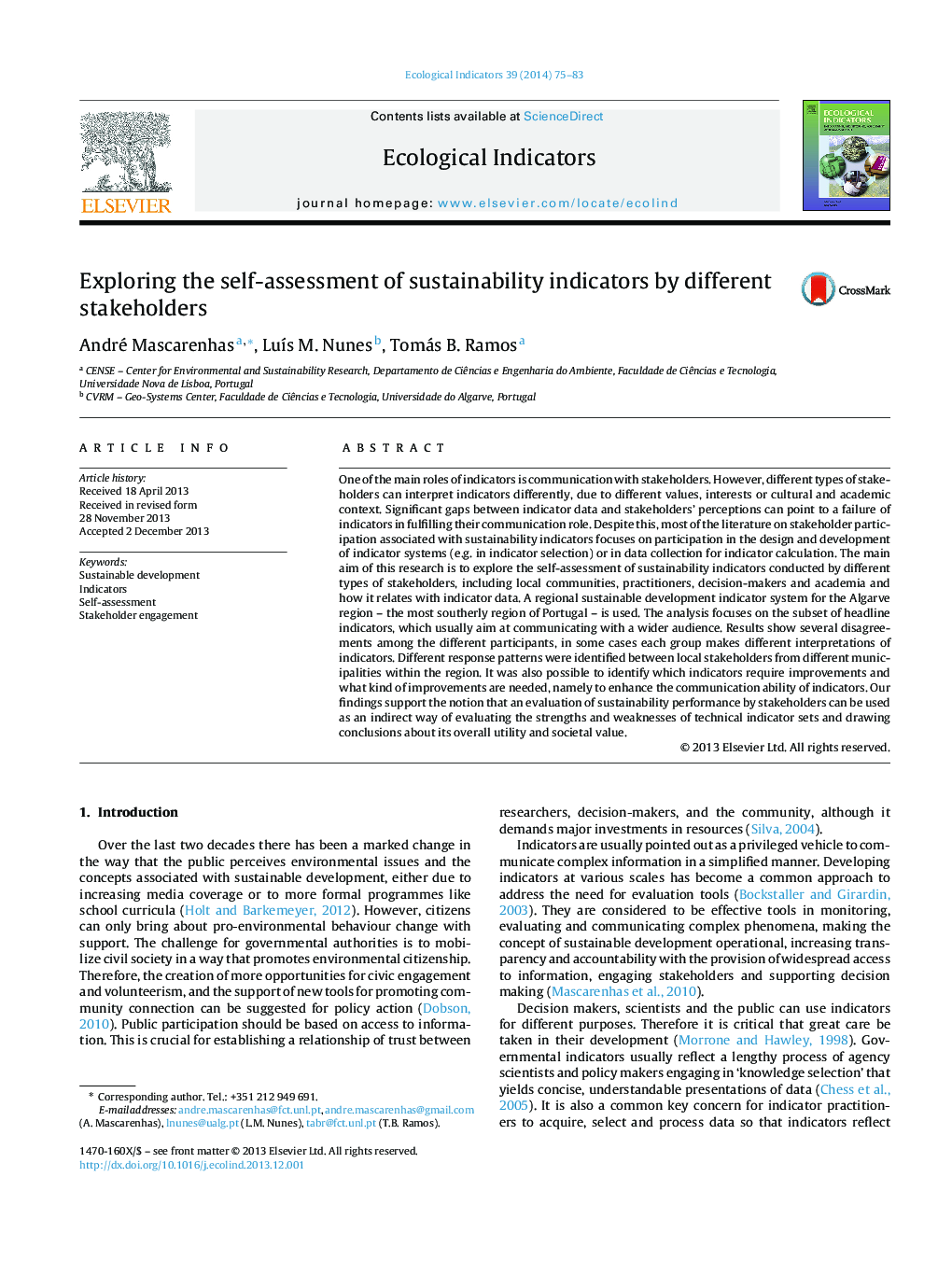| کد مقاله | کد نشریه | سال انتشار | مقاله انگلیسی | نسخه تمام متن |
|---|---|---|---|---|
| 6295402 | 1617162 | 2014 | 9 صفحه PDF | دانلود رایگان |
عنوان انگلیسی مقاله ISI
Exploring the self-assessment of sustainability indicators by different stakeholders
ترجمه فارسی عنوان
بررسی خود ارزیابی شاخص های پایداری توسط ذینفعان مختلف
دانلود مقاله + سفارش ترجمه
دانلود مقاله ISI انگلیسی
رایگان برای ایرانیان
کلمات کلیدی
توسعه پایدار، شاخص ها، خود ارزیابی، مشارکت ذینفعان،
ترجمه چکیده
یکی از نقش های اصلی شاخص ها ارتباط با سهامداران است. با این حال، انواع مختلف ذینفعان می توانند به طور متفاوتی با یکدیگر تفاوت داشته باشند، به دلیل ارزش های مختلف، منافع یا زمینه های فرهنگی و علمی. شکاف قابل توجهی بین داده های شاخص ها و ادراک ذینفعان می تواند به شکست شاخص ها در انجام نقش ارتباطی خود اشاره کند. با وجود این، بیشتر ادبیات مربوط به مشارکت ذینفعان با شاخص های پایداری بر مشارکت در طراحی و توسعه سیستم های شاخص (به عنوان مثال در انتخاب شاخص) و یا جمع آوری داده ها برای محاسبه شاخص ها متمرکز است. هدف اصلی این تحقیق، بررسی خود ارزیابی شاخص های پایداری است که توسط انواع مختلف ذینفعان، از جمله جوامع محلی، متخصصین، تصمیم گیران و دانشگاه ها و نحوه ارتباط آن با داده های شاخص، بررسی شده است. یک سیستم شاخص توسعه پایدار منطقه ای برای منطقه الغارو - منطقه جنوبی ترین پرتغال - مورد استفاده قرار می گیرد. تجزیه و تحلیل متمرکز بر زیر مجموعه ای از شاخص های عنوان شده است، که معمولا در ارتباط با مخاطبان گسترده تر هدف قرار می گیرد. نتایج نشان می دهد اختلاف نظر در میان شرکت کنندگان مختلف، در برخی موارد هر گروه تفسیر های مختلفی از شاخص ها را ارائه می دهد. الگوهای پاسخ مختلف بین سهامداران محلی از شهرداری های مختلف در منطقه مشخص شد. همچنین ممکن است مشخص شود که کدام شاخص ها نیاز به بهبود و چه نوع پیشرفت هایی دارند، یعنی افزایش توانایی ارتباطی شاخص ها. یافته های ما از این مفهوم پشتیبانی می کند که ارزیابی عملکرد پایدار توسط ذینفعان می تواند به عنوان روش غیرمستقیم برای ارزیابی نقاط قوت و ضعف مجموعه شاخص های فنی و نتیجه گیری در مورد ارزش کلی و ارزش اجتماعی آن استفاده شود.
موضوعات مرتبط
علوم زیستی و بیوفناوری
علوم کشاورزی و بیولوژیک
بوم شناسی، تکامل، رفتار و سامانه شناسی
چکیده انگلیسی
One of the main roles of indicators is communication with stakeholders. However, different types of stakeholders can interpret indicators differently, due to different values, interests or cultural and academic context. Significant gaps between indicator data and stakeholders' perceptions can point to a failure of indicators in fulfilling their communication role. Despite this, most of the literature on stakeholder participation associated with sustainability indicators focuses on participation in the design and development of indicator systems (e.g. in indicator selection) or in data collection for indicator calculation. The main aim of this research is to explore the self-assessment of sustainability indicators conducted by different types of stakeholders, including local communities, practitioners, decision-makers and academia and how it relates with indicator data. A regional sustainable development indicator system for the Algarve region - the most southerly region of Portugal - is used. The analysis focuses on the subset of headline indicators, which usually aim at communicating with a wider audience. Results show several disagreements among the different participants, in some cases each group makes different interpretations of indicators. Different response patterns were identified between local stakeholders from different municipalities within the region. It was also possible to identify which indicators require improvements and what kind of improvements are needed, namely to enhance the communication ability of indicators. Our findings support the notion that an evaluation of sustainability performance by stakeholders can be used as an indirect way of evaluating the strengths and weaknesses of technical indicator sets and drawing conclusions about its overall utility and societal value.
ناشر
Database: Elsevier - ScienceDirect (ساینس دایرکت)
Journal: Ecological Indicators - Volume 39, April 2014, Pages 75-83
Journal: Ecological Indicators - Volume 39, April 2014, Pages 75-83
نویسندگان
André Mascarenhas, LuÃs M. Nunes, Tomás B. Ramos,
